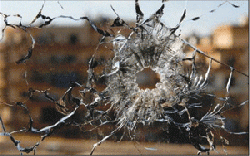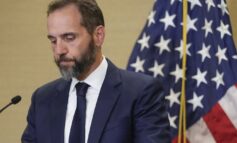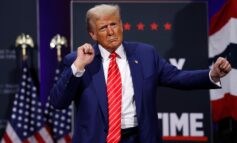Kidnappings spark protests as violence escalates

A series of violent clashes, protests and kidnappings related to the current Syrian crisis have fueled sectrian tensions in Lebanon recently, leading to concerns about more outbreaks in the near future and the creation of a climate of fear among many residents.
A Syrian Islamist cleric said on Thursday that he was mediating the release of 12 Lebanese Shi’a men kidnapped in Syria two days ago.
“They are well and safe, we are trying to secure their release, but the Syrian army shelling of the area has been blocking it so far,” Sheikh Ibrahim al-Zoaby, head of Free People of Syria group, told Reuters.
Zoaby said the kidnappers would issue a video or recording of the kidnapped men soon to show they were being treated well. He said the kidnappers want to hand the men to Lebanese authorities.
Lebanese Foreign Minister Adnan Mansour confirmed negotiations were underway to secure the release of the men, who were on their way back from a religious pilgrimage in Iran when they were kidnapped.
Mansour confirmed that the “kidnappers belong to the Syrian opposition,” and denied rumors those arrested had been involved in weapons smuggling.
Lebanese MP Robert Ghanem released a statement on Thursday calling the abduction a flagrant violation of Lebanon’s sovereignty.
On Wednesday Syria’s external opposition, the Syrian National Council, called on rebels in Syria to help secure the release of the pilgrims.
The kidnapping sparked a brief protest in Beirut’s southern suburbs on Tuesday, before Hizbullah leader Hassan Nasrallah urged his supporters to remain calm, prompting the protest to dissipate. Families of Lebanese Shi’a abducted in northern Aleppo as they returned from pilgrimage in Iran on Tuesday, blocked roads in mainly Shi’a neighborhoods of Beirut, demanding the release of men they said were held captive by Syrian rebels.
“We understand the emotions expressed…This is our responsibility…We can express our discontent in a civilized way,” Nasrallah said.
“If the parents want to protest or have a sit-in in a mosque, it’s their right. But, in the name of Hizbullah and Amal, nobody should block roads,” he added.
Relatives of those being held said rebels who seized a bus carrying the pilgrims originally set free the females and elderly men, but held 13 men to demand the release of insurgents.
Soldiers storm apartment, kill armed Syrian national
Two people were killed when Lebanese soldiers stormed an apartment in Beirut on Thursday where a gunman had exchanged fire with security forces, a security source at the scene said.
They found the body of another man in the apartment, along with rifles and grenades, and two men who were arrested. Four soldiers were wounded, the source said.
It was not immediately clear whether the incident, in the west Beirut district of Caracas, was linked to recent sectarian violence in the Lebanese capital.
At least two people were killed in Beirut on Monday in clashes between Sunni Muslim gunmen, and nine people were killed in the northern city of Tripoli in clashes earlier this month.
Stability fragile in northern Lebanon after clashes
On Tuesday, an Islamist supporter of the Syrian opposition was released on bail after a 10-day detention, a move that has defused tensions in Tripoli, but reverberations over last week’s killing of a prominent anti-Assad Muslim preacher and his companion by Lebanese Army soldiers in Akkar cast a pall of gloom over stability in north Lebanon.
Shadi Mawlawi, whose arrest on May 12 triggered deadly clashes in Tripoli between armed supporters and detractors of Syrian President Bashar Assad, received a hero’s welcome when he arrived in the northern city following his release. Mawlawi claimed he was tortured and rejected terrorism charges leveled against him as baseless, saying his arrest was politically motivated because of his support for the Syrian revolution. He vowed “to continue the struggle for this revolution.”
Asked to comment on media reports about his confessions, he said: “Yes, yes, I confessed to many things but only under duress and any person would have confessed to those things when placed under such psychological pressure and torture … I later disavowed my confession.”
An atmosphere of euphoria, punctuated by fireworks, prevailed in Tripoli after news of Mawlawi’s release spread. Residents demanded the release of 180 Islamists who have been jailed for more than four years without charges or trials.
Roads in Tripoli witnessed normal activity as security forces set checkpoints in the city’s main squares, while Army units deployed in key areas.
The detained Islamists had been arrested on charges of fighting or aiding fighters during the 2007 armed clashes between the Lebanese Army and the Palestinian militant group Fatah al-Islam in the northern refugee camp of Nahr al-Bared in Tripoli.
Interior Minister Marwan Charbel denied that Mawlawi’s release had been linked to political pressure, and said the decision had been purely “judicial.”
“His charge was a minor one. I learned that he was helping Syrian refugees. If this is the reason, then many Lebanese must be held accountable,” Charbel said.
Charbel warned of sectarian street clashes unless rival political leaders reached agreement to defuse tensions. “We have been living in an abnormal situation for nine months. Now, we are living on the edge of a volcano,” he said.
Mawlawi’s arrest sparked gunbattles in Tripoli, where tension has been simmering over the Syrian uprising. At least 11 people have been killed and 70 others wounded in the clashes pitting gunmen from the Jabal Mohsen neighborhood against rivals in Bab al-Tabbaneh.
The unrest spread to Beirut Sunday following the killing of Sheikh Ahmad Abdul-Wahed, a prominent anti-Assad Muslim preacher, and his companion, Sheikh Mohammad Hussein al-Mereb, at an Army checkpoint in the northern province of Akkar. Two people were killed in Sunday’s street clashes between Future Movement supporters and their rivals in the pro-Assad Arab Movement Party headed by Shaker Berjaoui in the Beirut neighborhood of Tariq al-Jadideh.
However, the celebratory atmosphere in Tripoli over Mawlawi’s release was dampened by tensions in Akkar, where the families of Abdul-Wahed and Mereb stopped receiving condolences in their hometown, Bireh, to protest the government’s failure to refer the killing of the two to the Judicial Council. The families held a meeting attended by Future MPs Khaled Daher and Moueen Mereibi to discuss pressing the demand to refer the case to the Judicial Council, while protesters cut off roads at the entrances of Akkar.
Mikati told reporters at his residence in Tripoli that he did not object to referring the case of the slain sheikhs to the Judicial Council. “In principle, I do not have an objection to that, but before presenting it to Cabinet, we should first consult with the justice minister and look into the issue from a legal point of view,” he said. Mikati added that the judiciary took appropriate measures toward the soldiers who were present at the checkpoint in the village of Kwaikhat in Akkar.
-Al-Akhbar, Reuters, Daily Star






Leave a Reply